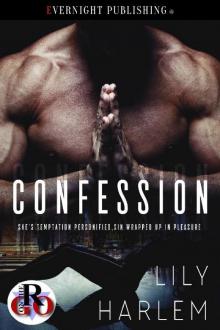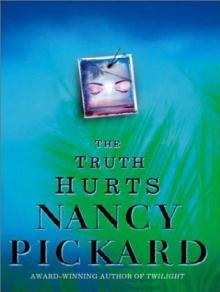- Home
- Nancy Pickard
The Whole Truth Page 2
The Whole Truth Read online
Page 2
“Hasn’t burned down,” Brad joked to Jeannie, in his laconic Maine accent, still pronounced even though he hasn’t lived there since he was twenty.
“Somebody left their fishing pole,” Jeannie remarked, traces of her Boston upbringing still as clear in her words as Maine is in his. “Looks like the cops caught him, too.”
Sure enough, as they neared the third bridge, they saw a fishing pole lodged firmly between two of the concrete posts on the upper side of the little bridge. Fishing there was illegal, the Williams knew, but people did it anyway. There is amazing affluence in Bahia, as there is in Pompano to the north and Fort Lauderdale to the south, but the homeless flock there, too, and people have to eat. Personally, Jeannie wouldn’t want to eat anything a person could catch from these canals. Maybe she’s being persnickety, she says, but she never can help thinking of all those big boats on the Intracoastal and all of the pollution they surely must leave behind them, regulations or no. Not to mention industrial effluents. No, what is in these canals can stay there, in Jeannie’s view. If she ever goes hungry, God forbid, she’d rather line up for soup at a shelter than to fish off these bridges.
As they slowly floated closer, they saw that the fiberglass pole was rigidly bowed and the line was very taut.
“Caught themselves an old inner tube,” was Jeannie’s guess.
“That dates you,” Brad teased her. “Don’t you know that tires don’t even have inner tubes anymore?”
“I said it was an old one, didn’t I?”
Bradley observed to himself that it looked like a substantial rig, like something his own fishing nut son-in-law might use to land a big, heavy swordfish, and not like a cheap old pole a tramp might use to snare a passing crab, or little sole. You wouldn’t think anybody would want to go off and leave it there. Even if it was snagged on something under the bridge, they could have cut the line and saved the pole.
He throttled back to slow down the boat even more.
Now they could see that an officer in the brown and tan uniform of the Bahia Beach Police Department was peering over the side of the bridge. He had on a short-sleeved shirt, and they could see the sun glint off the badge above his heart. Sunglasses dangled from his left hand. He looked at where the taut line disappeared into the dark water beneath the bridge, and then he looked at them in their boat. He yelled out to them, “Can you see what’s caught on the line down there?”
As Bradley eased Carousel as close as he could without running into the line, Jeannie slid over to starboard to try to get a look. At first, she couldn’t detect anything, because the water was so shadowed beneath the overpass. But then she caught a glimpse of something darker . . .
A fish?
No! She recoiled instinctively, because her second glimpse showed her something that looked like hair, and she immediately thought: canal rat. Getting herself in hand, she looked again. No, the hair was too light, too long for—
Jeannie brought her hands to her mouth in dismay.
She cried out, and Brad knew instantly that something was really wrong. It shook him up terribly when his wife screamed, “It’s a body! Oh, my God! It’s a child!”
Jeannie doesn’t remember saying that, or even screaming. What she remembers, what she can’t forget, is that she saw a clump of sodden hair floating in the water, and at the end of it, barely still hanging on, there was a pink plastic barrette, the kind that a little girl might wear.
As the tide inexorably lowered that morning, it revealed to the horrified observers a small human body, a girlchild, hung from the bridge by the fishing line wrapped around her broken neck.
The uniformed officer ran down the bank of the canal and plunged into the water without even stopping to remove his shoes. If there was any chance of reviving her, he wanted to get her out of there immediately. But even as he felt salt water fill his leather shoes, his common sense and experience told him she’d been dead for a while: Her neck looked broken, her skin was shriveled, and her little body hung limp and heavy in the water.
He determined that she was, in fact, irretrievably dead. Since that was the case, it became important for him to leave her exactly as they’d found her, in order to begin in an orderly way the investigation into her death.
Now sloshing wet, he clambered back out of the canal.
* * *
A small crowd of pedestrians began to gather.
It was awful, watching her body gradually appear above the water, as the level dropped, first her head, tilted heart-breakingly and unnaturally to one side, then her small shoulders clothed in a white T-shirt so wet that her skin showed through. In a terrible irony, the T-shirt bore a picture of the Little Mermaid, a favorite movie character of little girls a few years back. The people watching also saw pink shorts, bare legs and feet, but only when the little girl’s body was finally, gently, cautiously lowered into a police boat. Until then, it had to wait, hanging there for a much longer time than most of the spectators could bear, while police photographs were snapped, diagrams were drawn, notes were jotted down.
The child’s hair hung in stringy clumps almost to her shoulders. Because the hair was soaked, you couldn’t tell it was blond. Her hair looked the dark, nondescript color that blond hair looks when it gets very wet. The pink barrette still clung to its bit of hair at the end of one of the clumps.
Nobody wanted to leave her hanging there a second longer than necessary. But nobody wanted to make a mistake, either, which might prevent the person responsible for this crime from being apprehended and convicted. A certain deliberate speed was imperative, even if it did offend the civilians in the neighborhood. More than one person yelled at the officers down in the police boat on the water: “For God’s sake, cut her down! Can’t you at least cut her down?”
Down in the boat, there were two officers from the Bahia Beach Police Department marine unit, an invaluable branch of local law enforcement which was not “launched” until l965. Back then, one sergeant and two patrol officers made do with a single thirteen-foot dinghy to patrol l35 miles of interior coastline and five miles of beaches. An impossible task, of course. Now, decades later, the department boasts a dozen specially trained marine officers assigned to several different types of boats. The one down on the water on this day was a twenty-five-foot Boston Whaler. The officers in the marine unit are basically water traffic cops—handing out speeding tickets, arresting drunk boaters—but the unit is also called out when divers or water access to the scene of a crime are needed, like this one.
The officers in the boat cut her down as soon as they could, but that had to wait until the crime scene unit gave permission for it. The alternative to lowering her into the boat was to haul her up by the fishing line. It wasn’t that the officers on land were too squeamish or sensitive to do that, but if they did that, they ran the risk of mangling the neck wound, and causing posthumous injuries that might compromise the autopsy.
Everyone felt the relief of seeing the little body released from its noose, and the mercy of placing her into a black body bag. The marine unit removed her by water. In Bahia Beach, even the police department has boat docks—at Northeast Twelfth Street. It was faster and less public to take her that way.
Meanwhile, the bridge remained partially closed for a time, seriously annoying those motorists and boaters who didn’t know why. But this was Bahia Beach, and they should have been used to waiting for bridges to open.
The Williamses, Brad and Jeannie, gave their names and address to the police, and then they followed orders to get Carousel out of the way. They continued on, terribly shaken, to Brad’s parents’ place. They didn’t see the dead girl’s body removed from the canal. Jeannie was thankful for that, because just seeing what she did see was more than she wanted to have to remember for the rest of her life.
That next Sunday morning at St. Pious Cathedral, Jeannie and Brad held hands tightly, and they both shed quiet tears at Melanie’s christening. They thought of the other child and of the grandparents who grieved
for her. By then they knew, as all of south Florida did, who she was, and who had loved her. “Life is very special,” Jeannie told her daughters that day. “I’m grateful for every day of it that you girls are allowed to share with us on this earth.” She thinks that for the rest of her life, she will mean that more than she ever did before, and she knows she will find it difficult to let her grandchildren out of her sight when she baby-sits.
The crime scene unit arrived at the bridge soon after 7:30 A.M.
The original uniformed officer at the scene, Sergeant Jimmy Clubman, accomplished a lot before they got there. Conscientiously, though uncomfortably, he labored away in his wet clothes and shoes. A young officer with only two years of experience on the force, Clubman has two small children himself. He felt shaken up by his macabre discovery.
“I was just driving my route.” The sergeant explains how he slowly cruised the residential streets each morning. “I spotted this fishing rod stuck on that bridge, but I didn’t see anybody with it. I figured they saw me coming, and ran away and hid, and they didn’t have time to get their pole loose. I got out to look for them, because I figured they wouldn’t go far, not with that nice pole stuck there.”
He attempted to dislodge the rod from between the cement supports, but it was snagged so firmly on something in the water that he couldn’t budge it.
“If those people in that little boat hadn’t come by, I probably would have got back in my car and just left it there,” he admits, “because when I saw how tight that line was caught, I figured that was a better lesson to a fisherman than any warning I’d give him. It’s real easy to get your line hung up on the crap that floats by those bridges.”
Before the Carousel showed up, he pulled hard on the line a couple of times, but with no luck. Afterward, he shivered, not from being cold, but at the thought of what it would have been like if he had managed to yank the line up far enough to see what was caught at the end of it. He was glad that didn’t happen. In his two years on the force, he’d seen awful things. He knew there were some things he didn’t want to stumble across when he was alone. Having company, even if it was only two scared civilians, helped a little.
He knew he had to get down to business.
He told the Williamses to stay in their boat until the crime scene officers got there. “I felt sorry for them,” he says. “I mean, what a thing to come across, when you just happen to be out for a morning boat ride.” But he didn’t have any time to waste on them. They’d have to comfort each other. He had to secure the scene as best he could by himself, using his own patrol car and orange cones he removed from his trunk, to block off the lane of traffic closest to the fishing pole.
He didn’t think he should close both lanes, because these streets are man-made peninsulas, surrounded on three sides by water. If he shut down the whole bridge, the residents in their houses would be trapped for the duration of the crime scene investigation. They would be unhappy, and the fire department wouldn’t like it either. When Clubman called in to his supervisor to report the body, and to request assistance, he asked her to call out the marine unit to help secure the area by using their boats to block access from the water.
Before anybody else arrived, Sergeant Clubman noted 7:12 A.M. as the time he found the body. He also recorded the temperature, ninety-two F., and reported the weather as being sunny, with a very slight breeze from the south-east, no clouds, ninety percent humidity.
He hoped that information—particularly the time, temperature, and humidity—could help the medical examiner determine time of death. The temperature of the water needed to be taken as well, but the officers in the crime scene unit could figure that out, as well as confirm the other data. He carefully wrote down a description of the body and the scene, including his observation that the victim’s face appeared “peaceful.” He expected the crime scene officers to make their own notes, but he hopes to make detective, himself, one day. He tries to train himself for the future, by thinking like a detective, noticing what they would consider important, and writing that down. He noted there was none of the eye-bulging, tongue-protruding awfulness of the face that would have been present if she had been strangled.
“Personally, I figured she didn’t die from hanging from the fishing line,” he says. “I figured she was dead before they hung her, and it seemed pretty obvious she was murdered. I mean, what else could it have been?”
Neither he nor anyone else investigating the death ever seriously considered the possibility that this was a suicide. For one thing, there was the extremely young age of the deceased. It wasn’t that kindergartners never killed themselves; sadly, it was known to happen. But there was also the manner in which she was hung, which seemed impossible for her to accomplish by herself. They did toy briefly with the idea of this being some kind of macabre accident. Early on that first day, somebody with a warped sense of human capabilities suggested that maybe some kids played “fisherman,” they used the child as “bait,” and then they ran away, terrified, when they saw the consequences. But generally, the scene, the victim, and the method all screamed “homicide” at the police.
Clubman judged the victim to be around six years old.
That educated guess was right on the money. Her last birthday was May first. The child was white. Later, she was measured precisely and found to be exactly two feet eleven inches tall. Forty pounds. She was a little slip of a girl, with dark blond hair that was blunt cut at shoulder length, worn with long bangs. As everyone learned eventually, she had liked her mom to pull the sides of her hair back off her pretty face and fasten them at the top of her scalp with one of her legion of plastic barrettes, one for nearly every color she could name. She had dark blue eyes. None of the crime scene personnel knew that until later, because when they first saw Natalie her eyes were closed. For the men who cut her loose and then lowered her tenderly into the police launch, that was a mercy. Even the most inured among them find it hard to look a dead child in the eyes.
The Bahia Beach police identified her quickly.
Surprisingly, there wasn’t a missing persons report out on her. But little Natalie carried in the right pocket of her pink shorts an identification card encased in protective plastic.
“My name is Natalie Mae McCullen. I live at 2533 Palm Sunrise, Bahia Beach, Florida. My phone number is 394-999-1232. My parents are Susan and Anthony McCullen. Please call them for me. Thank you.”
It may seem odd that she carried that card, because she appeared to be old enough to be able to remember her own address and phone number. Neatly typed in black on white, the ID card almost made it seem as if somebody expected Natalie McCullen to be identified by strangers. But the real explanation for the card was printed on it in bold black letters: I am deaf.
It took all of about ten seconds for Sergeant Clubman’s boss to realize that this was going to be a high-profile case conducted in the public eye. The killer almost seemed to have placed it there purposefully, in plain view. The victim, the method, and the neighborhood all added up to an important case as these things are measured. She expected the media to go crazy over it. Acting quickly, she shunted it down proper channels until two fine detectives, Paul Flanck and Robyn Anschutz, got assigned to the case.
Detective Paul Flanck looks Hispanic, but isn’t.
“It helps,” he says, “especially down here where it seems like every other person speaks Spanish.” At the time he was assigned to the case of the little girl found hanging from the bridge, he was thirty-two years old, and a self-described “fanatical runner, weight lifter, and good ol’ boy,” originally from Fort Meyers, Florida. He was divorced, with no children. His perpetual hobby was taking Spanish lessons. “I can see the future,” he says, wryly. It’s a future, he means, in which English is the second language in south Florida.
That isn’t an outlook that Detective Robyn Anschutz shares with him. At thirty-four and married to the son of a Cuban exile, she feels that Hispanics endure minority status, no matter what their populat
ion numbers. A pretty woman with short blond hair, a warm smile, and sober brown eyes, Robyn makes a striking physical match with her police partner. They are the same height, five foot ten, although Robyn’s hair, back-combed a bit on top, gives her an illusory inch on him, which she likes to tease him about.
The topic of the Hispanic population is only one of many subjects that the two detectives were known to bicker about, almost like an old married couple. They are both frank enough to admit that theirs was not a pairing made in heaven. “Far from it,” says Robyn, laughing, implying that it was a match made about as far from heaven as you can get—down on the first floor of police headquarters, in fact, where the top brass recognized each of them as top-rate detectives.
With her warm smile, Robyn gets felons to talk, and with his muscular, intense manner, Paul intimidates people without ever touching them. They were both known as dedicated cops. If any pair could produce quick, reliable results that wouldn’t end up embarrassing the department, it was felt that Flanck and Anschutz could do it. They were expected to put aside their personal differences.
One of the few things they have in common—besides being good cops—was that neither has kids, not even step-kids. Paul asked later if that was one reason they were assigned to the case. “Was that supposed to make us more objective?” he asked their boss, the captain of detectives. “Did you think that we’d get less emotionally involved because of that? Because if that’s what was supposed to happen, it didn’t work.”
He was told that hadn’t anything to do with it.
Such misgivings came later, when in hindsight, every case can be conducted better and every Monday-morning quarterback will tell you how. On the morning of July seventeenth, the only thing that Detectives Flanck and Anschutz knew was that they were commanded to get to the scene as soon as possible. The detectives would rely on the forensic unit, which is part of the C.I.D., or Criminal Investigations Department. As Paul explains, “They’re our crime scene unit, our specialists. They gather evidence at the scene, and they’re responsible for preserving it and presenting it in court.”

 The Scent of Rain and Lightning
The Scent of Rain and Lightning No Body
No Body The Secret Ingredient Murders: A Eugenia Potter Mystery
The Secret Ingredient Murders: A Eugenia Potter Mystery The 27-Ingredient Chili Con Carne Murders: A Eugenia Potter Mystery
The 27-Ingredient Chili Con Carne Murders: A Eugenia Potter Mystery Twilight
Twilight Marriage Is Murder
Marriage Is Murder I.O.U
I.O.U The Virgin of Small Plains
The Virgin of Small Plains Generous Death
Generous Death The Whole Truth
The Whole Truth The Blue Corn Murders
The Blue Corn Murders Say No to Murder
Say No to Murder Confession
Confession Dead Crazy
Dead Crazy The Truth Hurts
The Truth Hurts Bum Steer
Bum Steer